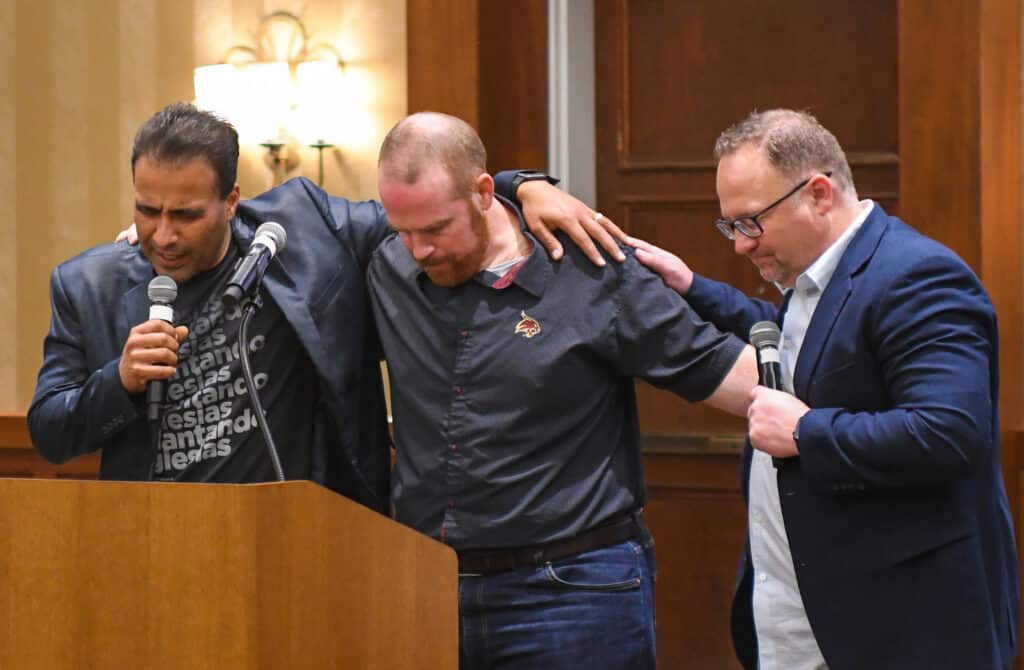The SBTC will continue to lead with its frontline ministries of church planting and missions/evangelism, but some other ministries of the convention will be strategically elevated in response to needs cited by several hundred church leaders in a series of 26 meetings held last year across the state, SBTC Executive Director Jim Richards said.
On Aug. 7, the SBTC Executive Board in its summer meeting adopted a “Refocus Report” calling for a strategic approach in the ministry areas of leadership enhancement—the most cited need among pastors— ministry relationships, discipleship, prayer, Spanish-language ministry, technology, and missions.
The 27-page report follows the series of “Praying and Listening” sessions held last year across the state as SBTC staff members, led by Richards, prayed with and listened to the concerns of pastors and lay leaders attempting to fulfill the Great Commission through their local churches.
The SBTC Executive Board acted earlier this year by authorizing further study and a strategic response through an ad hoc “Refocus Committee” of select convention staff members.
It is not a reorganization, Richards emphasized, but rather a strategy shift. Some organizations alter their operations because of personnel issues or budgetary concerns, but neither is the case with Refocus, he added, noting that CP giving continues to be strong.
The strategy will be reflected in only a few staff changes, with the convention staff emerging in 2013 with a net gain of three positions resulting from the changes.
“In fact, most of what was mentioned in the Praying and Listening meetings is already being done,” Richards said. “However, under Refocus we will have a more strategic and emphasized approach in these areas. For example, although we have been doing useful leadership ministry, we will now have a team leader who will help us promote leadership ministry in an overarching model throughout several departments,” namely church ministries, language ministries and minister-church relations.
Richards said the majority of those who cited leadership as a need were talking about relationships, such as a mentor, enhancing their leadership capabilities.
“So the areas of church ministries, minister-church relations and language ministries will seek to have a leadership enhancement component either through relationships or education or some type of equipping. That shifts all three of those areas of ministry under a paradigm of leadership so that what we do is about leadership.”
Other changes include a ministry associate dedicated solely to discipleship—the second-most mentioned need of church leaders.
“Again, we were doing a lot concerning discipleship but we had no one assigned to that as a major portion of their duties. So it’s more than putting a label on something to give it priority,” Richards said. “It’s actually work assignments, employees, job responsibilities, and a strategy shift.”
Richards said varied forms of discipleship methods were available but most participants in the Praying and Listening sessions asked for a more definitive approach offered by the convention.
What will result is an elevation of that aspect of the church ministries department, with a dedicated minister helping churches as they make disciples, he explained.
Other areas that will receive strategic emphasis include helping churches navigate through the intersection of technology, social media and ministry, another prominent theme among the pastors.
The convention staff is also ramping up its strategy for Spanish language ministry, including a new Hispanic Baptist Institute of Biblical Studies. Although not officially a part of the Refocus Report, the institute dovetails with the strategic shift toward language ministry at an opportune time in the life of the SBTC.
Existing SBTC departments will fall under one of three overlapping teams, namely missional ministries (missions and evangelism), leadership ministries (church ministries, minister-church relations, and language ministries), and supporting ministries (communications, facilitating ministries, and operations).
Missional ministries will now include both missions and evangelism, according to the report.
Also, a prayer ministry dedicated to the aim of seeing spiritual awakening and revival take root will be a part of the leadership ministries area.
In proposing the strategic shift, the Refocus Committee weighed what church leaders requested with the mission statement given to the convention at its founding, Chief Financial Officer Joe Davis told the TEXAN.
The mission statement reads: “The SBTC exists to facilitate, extend and enlarge the Great Commission ministries of the Southern Baptist Convention and Southern Baptist churches and associations of Texas, upon the authority of God’s inerrant Word to the glory of God the father, under the Lordship of Jesus Christ, and by the empowerment of the Holy Spirit.”
The Refocus Report will be implemented in 2013 pending approval of the proposed convention budget during the SBTC annual meeting, scheduled Nov. 12-13 at Castle Hills First Baptist Church in San Antonio.














